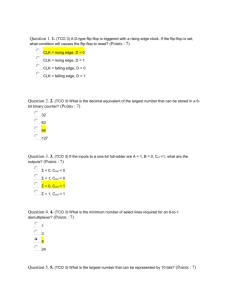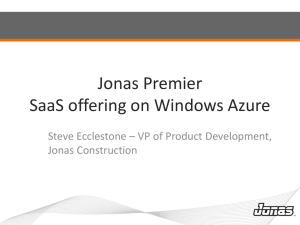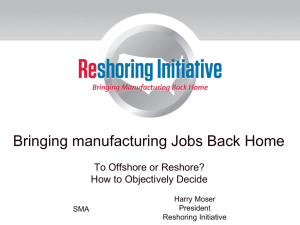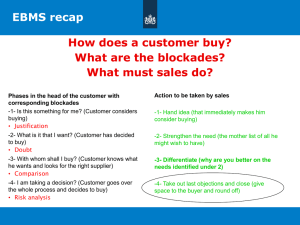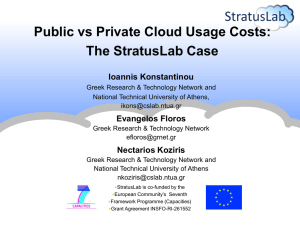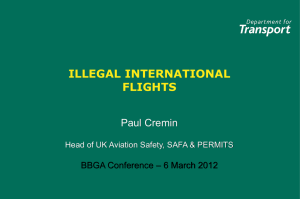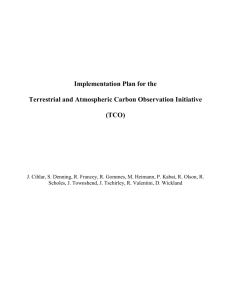Total Cost of Ownership - ISM
advertisement
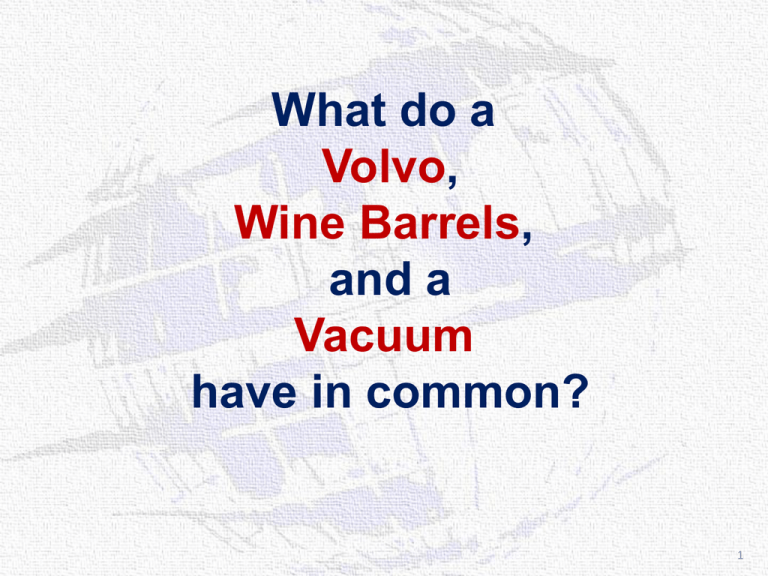
What do a Volvo, Wine Barrels, and a Vacuum have in common? 1 Purchase 1998 Volvo V70, T-5 (Sweden) Discount Sales tax (90-day rule) Delivery to Port Hueneme (6-weeks) Train/taxi to Port Hueneme Luxury tax (10% over 36K) $ 39,000 (6,500) 0 0 60 0 European license/Insurance for 3 months 555 Airfare (Continental miles) 0 Total Cost to take delivery in Göteborg/PH $ 33,115 Purchase 1998 Volvo V70, T-5 (SD, CA) Discount Sales tax (7.25%) Luxury tax (10% over 36K) $ 39,000 (2,500) 2,646 50 European insurance for three months Airfare (Continental miles) Total Cost to take delivery in San Diego Rent equivalent Volvo (Europe) 0 0 $ 39,196 $ 6,000 $ 45,196 2 “Exhausted” white oak red wine barrels from Temecula winery $ 40 each Issues: • Choose and transportconsiderations: barrels ½ workday (2 people) Other ‘soft/indirect’ • Number of of barrels in oneand trip lost (no productivity min.) 30 • Wages employees • Storage at PRDH/BMI • capacity Head designer is billable at $90/hr. 30 • Fuel & 17’ box (rent) $ 150 • Inability to truck choose barrels at Napa (lower yield?) Total• Direct $ 1,350 ($45/barrel) BarrelCost cost is 20% of direct costs of a chair • (FYI... white Cost ofoak new barrel $1,000) “Exhausted” red wineisbarrels Lackwinery of storage capacity, as well as personnel breakdown and from• Napa $ 22 to each Issues: kit barrels, but... • Establish relationship(s) for sustainable sources of supply • Inspect and arrange purchase 3 workdays (2 people) • Build new business relationships for marketing barrel furniture • Number of barrels in one trip (min.) 70 • Enjoy road trip... • Travel expenses $ 300 • Other considerations ??? • Storage capacity at PRDH/BMI 30 • Fuel & tractor semi-trailer (outsource) Total Direct Cost $ 1,050 $ 2,890 ($41/barrel) 3 21 pounds ~ $230 17 pounds ~ $150 4 All of the decisions involve the application of (or lack thereof...) TCO (Total Cost of Ownership) Total Ownership Cost – TOC Total Cost – TC Total Cost of Operation Life-cycle Cost (TCO over time) All-in-Cost Relevant Cost of Ownership - RCO 5 And now for some academic stuff... 6 What is TCO? TCO is a Philosophy, Methodology, and Tool for analyzing all the relevant quantitative and qualitative costs of an acquisition, project, investment, or relationship in order to make a decision... 7 TCO as a philosophy… TCO looks beyond the purchase price of a part, subassembly, asset, investment, project, and/or service… TCO seeks to include all relevant information that will affect the outcome… TCO considers qualitative considerations, as well as quantitative… TCO seeks to understand short and long-term costs and benefits (life cycle cost)… TCO explores customer and/or supplier relationships to determine their value to the organization… 8 TCO as a Methodology 1 A TCO analysis attempts to determine the type of buy, then applies certain processes and analytical tools to support the decision process. In general, TCO considers quantitative and qualitative Acquisition Costs Ownership Costs Post Ownership Costs 9 TCO as a Methodology 4 Classification of Decisions: Low Impact – low-cost commodity items (e.g., copier paper) Leverage – large purchases of items in competitive markets (e.g., disk drives) Strategic Item – large purchases from important suppliers (e.g., commercial airline jet engines) Critical Projects – large dollar volume infrequent purchase (e.g., production facilities using various technologies/processes) 1 Adapted from Supply Chain Management, Fawcett/Ellram/Ogden, Ch8 10 TCO as a Methodology 4 Apply TCO to appropriate buy1 e.g., commodity items, supplier A v. B, domestic v. offshore e.g., alternative SC configurations, LCD v. Plasma, Important supplier relationships Don’t waste a lot of time here e.g., infrequent purchases, custom software, 1 Adapted from Supply Chain Management, Fawcett/Ellram/Ogden, Ch8 11 TCO as a Methodology 4 Many qualitative considerations can actually be quantified by careful analysis There is a TCO issue in performing a TCO analysis. The cost/benefit relationship needs to be analyzed before committing the time and resources Garbage in, garbage out – care must be taken when determining what and how to measure Management’s concern is the effect of the TCO object/decision on the bottom line! TCO takes the emphasis off generic cost reduction initiatives to support the strategic contributions of supply management 12 TCO as a Tool TCO and Direct Materials, Direct Labor, and Overhead TCO and Services TCO and Inventory TCO and Capital Equipment TCO and NPV (net present value) Analysis TCO and International Sourcing TCO and the Logistics process TCO and Qualitative Considerations TCO and MRO, Production/Operations, Services TCO and Supply Chain Optimization 13 TCO as a Tool Inventory Non-Delivery Poor Quality Transportation and Packaging Carrying Working Capital ! Insurance Property Taxes Floor Space Obsolescence/spoilage Administration ?????? 14 TCO as a Tool Quantitative & Qualitative KATV Inc. Differential analysis ATV Engine Supplier 1 m inus Supplier 2 Total Cost Analysis (annual) Supplier 1 Description formula Total engine cost Cash discount n/30 discount available Largest discount Tooling Cost Transportation cost (22,000 lb. LTL) Ordering cost Carrying cost Quality cost Delivery rating Back Order (50% ) Lost sales (50% ) 6,000,000 x 0.10 x 30/360 6,000,000 x (0.10 x (10/360) +0.02) Performance Metrics Quality Technology Plant & Processes Environmental Financial Responsiveness (inc. Delivery) Business 50,000.00 136,666.67 amount 5,976,000.00 12,000 x $498 5,976,000 x 0.10 x 30/360 5,976,000 x (0.10 x (10/360) +0.01) 24,000.00 49,800.00 76,360.00 given 125 x 12,000 x 22 x $1.20/2000 12,000/1,000 x $125 1,000/2 x $500 x 0.20 6,000,000 x 0.02 -136,666.67 22,000.00 19,800.00 1,500.00 50,000.00 120,000.00 given 100 x 12,000 x 22 x $1.20/2000 12,000/1,000 x $125 1,000/2 x $498 x 0.20 5,976,000 x 0.03 -76,360.00 20,000.00 15,840.00 1,500.00 49,800.00 179,280.00 (60,306.67) 2,000.00 3,960.00 0.00 200.00 (59,280.00) 12,000 x 0.01 x 0.50 x $15 12,000 x 0.01 x 0.50 x $4,500 x 0.18 900.00 48,600.00 12,000 x 0.02 x 0.50 x $15 12,000 x 0.02 x 0.50 x $4,500 x 0.18 1,800.00 97,200.00 (900.00) (48,600.00) 6,126,133.33 ` 6,265,060.00 138,926.67 Weight 0.25 0.20 0.18 0.16 0.11 0.05 0.05 1.00 Difference, in favor of… formula 6,000,000.00 12,000 x $500 Total Cost Difference, in favor of… Supplier 2 amount Supplier 1 Rating 93 85 87 86 86 91 88 Final Value Supplier 1 Weight 23.25 17.00 15.66 13.76 9.46 4.55 4.40 0.25 0.20 0.18 0.16 0.11 0.05 0.05 88.08 1.00 2.37 Principles of Supply Chain Management 3e (Wisner. et al.) Supplier 2 Rating 88 94 82 98 91 89 95 (138,926.67) Final Value 22.00 18.80 14.76 15.68 10.01 4.45 4.75 1.25 (1.80) 0.90 (1.92) (0.55) 0.10 (0.35) 90.45 Supplier 2 2.37 15 TCO as a Tool Quantitative TCO-NPV Analysis Machine A Interest rate plus risk premium Years 8.25% 0 1 2 3 4 5 Machine A Machine B Present Value Present Value CASH OUTFLOWS Purchase price (612,000) Installation and site preparation (9,000) Sales tax Setup and testing (6,000) Expected repair and maint. maintenance costs Expected operating costs 0 Income tax on net revenues 0 0 (612,000) (510,000) (9,000) (9,000) 0 (38,542) (6,000) (2,000) 0 (4,500) 0 (6,625) (7,500) (6,400) (6,800) (15,148) (14,029) (5,800) (5,675) (5,320) (22,095) (24,943) (27,289) (31,358) (33,007) (32,259) (30,666) (122,115) (103,314) CASH INFLOWS Expected increase in revenue generated by production Expected salvage value 0 142,325 165,000 180,000 175,000 167,000 0 0 0 0 Expected depreciation Tax shield benefit 0 20,790 20,790 20,790 0 102,000 20,790 20,790 653,985 560,758 68,622 77,367 82,464 69,826 18,713 6,124 9.28% (627,000) 131,326 147,807 154,483 151,456 247,004 18,713 8.62% 6,124 16 TCO as a Tool Quantitative Buy (US) Buy (China) 60,000 Per unit Annual cost $30.00 $1,800,000 $0.75 $45,000 $0.10 $6,000 $0.25 $15,000 Unit cost Packing cost Tooling Freight Wiring Harness Savings $1.67 or ≈ 5.4% Is it worth the added risk? TOTAL COST $31.10 $1,866,000 60,000 Unit cost Packing cost Inland transport Freight forward fee Ocean transport Marine Insurance US. Port Handling Customs Duty Customs broker fees US Transport Warehouse Cost Cost of capital Cost of hedging Administrative time Travel Tooling TOTAL COST Purchasing and Supply Chain Management 4e (Monczka, et al.) Per unit Annual cost $19.50 $1,170,000 $2.00 $120,000 $0.12 $7,200 $0.02 $1,200 $2.40 $144,000 $0.11 $6,600 $0.72 $43,200 $0.98 $58,500 $0.03 $1,800 $1.86 $111,600 $0.50 $30,000 $0.71 $42,353 $0.08 $4,800 $0.02 $1,200 $0.33 $20,000 $0.05 $3,000 $29.43 $1,765,453 17 TCO as a Tool Supplier risks/considerations: Overseas business Risks: Design changes Supplier integration in new product development On-going cost savings sharing agreements On-site technical support Alignment of corporate cultures Other joint improvement initiatives (e.g., R&D) Financial stability Means of production/process capability Supply chain integration/processes Lead time Labor skill set Quality and technology Early supplier involvement Price escalation Volume changes/capacity Cost sharing Delivery ? Political stability Economic stability Relations between countries Exchange rate volatility Communication (language) Time zones Labor skill set Accessibility to technology/engineering Political corruption Travel Infrastructure (transportation, communications, energy, water, waste, etc.) Local laws Customer/culture ? Adapted from Purchasing and Supply Chain Management 4e (Monczka, et al.) 18 TCO as a Tool Quantitative Description Cost/lb. Shipment Annual Running Subtotal Cost per pound Purchase price/pound Ocean freight Import duties A. Landed cost (price paid, ocean freight, import duties) 0.2900 0.0575 0.0435 0.3910 11,600.00 2,300.00 1,740.00 15,640.00 139,200.00 27,600.00 20,880.00 187,680.00 Dock to stock Ship to local warehouse/container Storage 0.0165 Warehouse fee subtotal 0.0063 0.0014 0.0030 0.0106 250.00 55.00 120.00 425.00 3,000.00 660.00 1,440.00 5,100.00 0.0360 1,440.00 17,280.00 0.0466 1,865.00 22,380.00 0.4376 0.0038 0.0010 0.0080 0.0120 0.0625 150.00 40.00 321.30 481.95 2,500.00 1,800.00 480.00 3,855.60 5,783.40 30,000.00 0.4414 0.4424 0.4504 0.4625 0.5250 0.0873 3,493.25 41,919.00 0.5250 0.5250 20,998.25 251,979.00 0.0787 3,149.74 37,796.85 0.6037 24,147.99 289,775.85 Interest on value of average inventory 0.0375 B. Transportation & warehousing cost subtotal Warehouse to production cost Freight Quality control Purchasing and storing loss 2% 0.00916 Factory yield 3% 0.01401 Spoilage/recall C. Warehouse to production cost Total cost of Guava Puree before SG&A SG&A Total cost Formula Given $2,300/40,000 = $0.0575 $0.29 x 0.15 = $0.0435 0.3910 $250/40,000 = $0.00625 $5.50 x 10 / 40,000 = $0.001375 $6 x 20 / 40,000 = $0.003 0.4016 $0.401625 x 240,000 x 0.18 / 480,000 = $0.036 $150/40000 = $0.00375 $2 x 20 / 40000 = $0.001 40,000 x 0.02 x $0.401625 / 40,000 = $0.008 40,000 x 0.03 x $0.401625 / 40,000 = $0.01205 $20,000 x 1.5 / 480,000 = $0.0625 $0.5250 x 0.15 = $0.07875 0.6037 Purchasing and Supply Chain Management 3e (Monczka, et al.) 19 TCO as a Tool Quantitative Slide provided by Rey Huerta, President of Enterprise Logistics Solutions Zero-Based Theoretical Analysis 20 Component Outsourcing Logistics Outsourcing Buying components Buying a service process Buyer supplier(s) internal customer(s) relationship Buyer third party supplier(s) & third party supplier(s) ultimate customer relationship Initiate PO and verify final receipt Less people dependent, fewer interfaces Trend to eliminate monitoring and inspections via supplier certification ??? Monitor series of service transactions More people dependent, more interfaces Continuous monitoring over time to create visibility ??? Arnold Maltz & Lisa Ellram suggest this modification to the TCO framework is necessary to account for the extra interface, quality measurement, and customer satisfaction costs involved in using TCO analysis in Logistics decision-making. TCO + Logistics = TCR (total cost of the relationship) 21 TCO as a Tool Qualitative Pugh Matrix Supplier Requirements/Attributes 5 0 - - - Cost 8 0 - - - Logistics 10 0 - - 0 Development 10 0 0 0 0 Business 10 0 - 0 0 Technology 10 0 + - + Physical environment 8 0 0 0 0 Human environment 4 0 + + + 4 0 0 0 0 Handling 9 0 + + + Ride 5 0 0 0 0 Cornering 10 0 + + + Acceleration 10 0 0 0 0 0 OR Mate Option 1 Option 2 Option 3 Quality OR Machine Importance Baseline of Need 4 0 0 0 Communication 10 0 - - - Physical persona (looks) 4 0 0 0 0 Spiritual persona (soul) 10 0 0 0 0 OR 10 0 + 0 0 ? 10 0 0 + + Sum of positives "+" 0 5 4 5 Sum of sames "0" 19 9 10 11 Sum of negatives "-" 0 5 5 3 Weighted sum of positives 0 43 33 43 Weighted sum of negatives 0 -43 -43 -23 Total weighted sum 0 0 -10 20 151 22 So...what is TCO – really? A Way of Thinking… Understand and concentrate on your core competencies Direct your focus from tactical to strategic Be proactive, not reactive Emphasize total cost, not just purchase price Understand the qualitative, less tangible issues in a procurement Measure, so you can manage Know the Voice of your Customer (VOC) Develop and align your key performance indicators (KPI’s) with VOC Gather data to gain knowledge Truth is not reality, truth is perception (Rey Huerta, President Enterprise Logistics Solutions) 23 Supply Management & TCO (Adapted from Supply Chain Management, Fawcett/Ellram/Ogden, Ch8) Candidates for TCO analysis Large dollar spend items Regular purchases requiring cost information Procurements with significant unrecognized transaction costs When purchasing can impact transactions costs, via negotiation, changing suppliers, and/or improving internal operations. When there is a desire for cross-functional involvement in understanding item or service cost structure Capital purchases Value network optimization 24 Supply Management & TCO (Adapted from Supply Chain Management, Fawcett/Ellram/Ogden, Ch8) Reasons for TCO analysis Performance measurement Framework for cost analysis Benchmarking performance More informed decision making Communication of cost issues internally and with suppliers Encourages cross-functional interaction Support external teams with suppliers Better insight/understanding of cost drivers Build a business case Support an outsourcing analysis Support continuous improvement Helps identify cost savings opportunities Prioritize/focus your time on high potential opportunities 25 Would all of these benefit from TCO analysis? • • • • • • • • • • • • • • • • Study for advance degree, continue working, or both Buy a vehicle (new v. used, compact v. small SUV, …) Lease v. buy Rent v. own Investment A v. B Adjustable rate mortgage v. fixed rate 747-8 v. A-380 Vacation options (Egypt v. Japan?) Drive v. Fly Make v. Buy Project A v. Project B. Supplier A v. Supplier B, or both Production Process A v. B v. C Remain in a bad marriage v. divorce Cloud based software v. computer resident Obama v. Romney economic plans 26 I wonder if a TCO mindset would have been beneficial in this situation ? 27
